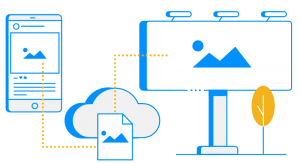You’ve probably heard of CRM software—used it in the past, gotten sales calls about adopting one, wistfully wished your customer data was nicely organized inside one. But if you haven’t, don’t worry. I myself was once a wet-behind-the-ears college intern throwing acronyms around like candy without any clear idea what the letters stood for.
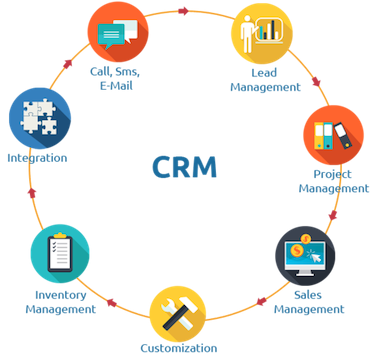
CRM stands for customer relationship management. So do you need CRM? Yes. All businesses need to have an organized way of keeping track of clients and prospects as they move through their customer journey. But do you need CRM software? This depends on your business size, model, industry, customer type, and more. So in this post, I’m going to:
- Demystify exactly what CRM platforms are and how they help with sales and marketing.
- Cover the pros and cons of implementing CRM for small businesses in particular.
- Discuss costs and crucial features to look for when considering a CRM for your business.
By the end of this post, you’ll have a firm understanding of the role a CRM plays in business growth as well as the potential value it could have for your small business.
What is CRM software?
CRM stands for customer relationship management but it typically refers to a tool or solution that helps businesses track and manage interactions with customers and prospects. In broad terms, it’s a database that holds information like first name, last name, email address, company, a log of encounters with your business, and so on.
Your CRM will act as the main place to keep all the information you’ve gathered throughout your relationship with your clients. From the first time they read a blog post or sign up for your newsletter, to phone recordings of sales calls and lead qualifications, it’ll all be in one central location. CRM even manages the process through to sending proposals, contracts and billing information (with some plug-ins).
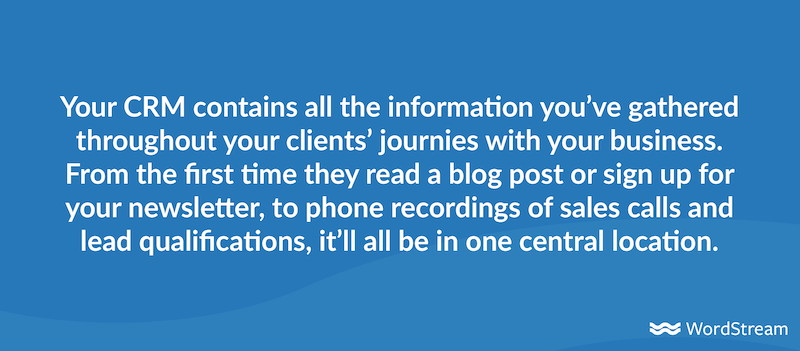
Think of a CRM platform as a multidimensional map. You have people, companies, and deals all connected through different interactions-—like viewing an ad, opening an email, taking a sales call, or signing a contract. Your team members are connected to action items and can add information to contacts, accounts, and deals as needed. All this information creates a web of insights to help you manage processes and relationships with the people who have decided to do business with you.
The pros of CRM software for small businesses
There are a lot of good reasons to have a CRM software platform at your disposal. However, it’s hard work to get it integrated, particularly if you don’t have much infrastructure already built into your business relationships. We’ll go over those challenges in the next section, but first, let’s get to the good parts of CRM software.
Organization
While I can’t profess to be the most organized person (my roommate would argue that I need to stop keeping my books in the kitchen), all marketers thrive when our files, content, tasks, and communications are all in one place, or at least one organized system.
CRMs help you collect, sort, and filter your prospect and client information according to various criteria, like account type, location, contact person, channel, and company. That means you can group all contacts who work for the same company together, or the internal team that works on a certain account; just think of all the reports you could run!
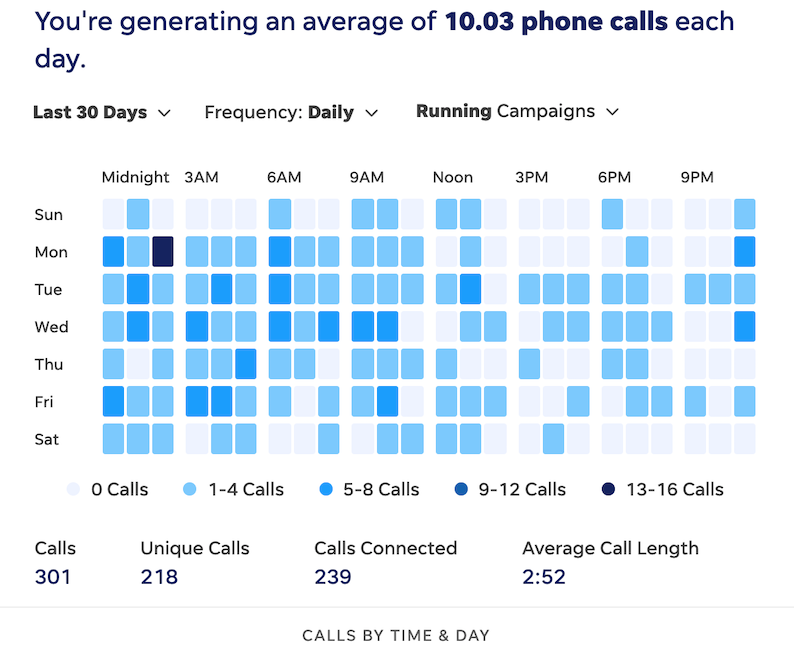
From LOCALiQ’s Client Center CRM
And the more organized and centralized your information is, the easier it is for you to pull up when communicating with a current or potential client and have the context you need in order to have a productive conversation. Also, while it’s a best practice to have a dedicated account representative for each customer, having the information available to more people allows you to transfer information more easily, such as if that reprsentative leaves or your business starts to scale up.
Communication
At the risk of sounding like a broken record: marketers thrive with better communication. And I don’t just mean having regular meetings with the sales team. CRMs enable seamless communication between your prospects, marketing team, and sales team.
Picture it: a prospect enters their information on your website. Almost instantly, that lead is entered into the CRM so your marketing team can retarget them with ads, nurture them with emails, and move them down the marketing funnel. Simultaneously, the sales team can reach out through emails and calls, logging each interaction into the system. By the time the prospect is ready to sign a contract or make a purchase, you’ll have a full picture of each touchpoint they experienced.
Efficiency
For the aforementioned reasons that we love CRMs, they use streamlined communication and organization to create efficiencies. When it comes time to close the books on a fiscal year, or you get audited, or you need to reference exactly what your sales team promised a customer, it’s all right in your CRM.
Organization, communication, and efficiency are just three of the many positive aspects of a CRM platform that can lead to several benefits, including:
- Better collaboration among team members
- More movement through your marketing and/or sales funnel
- Time and cost savings from maximized productivity
- Happier customers, more loyal customers, and of course, more customers
- Increased revenue
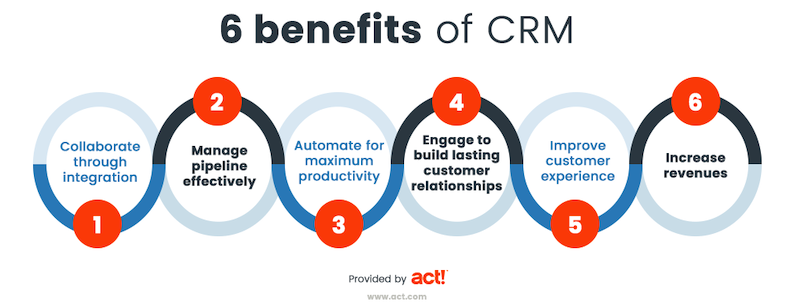
The cons of CRM software for small businesses
As mentioned above, there are some challenges that come with CRM software. Luckily, there are fewer cons than pros.
Implementation
I’m not going to lie to you. CRMs can be quite complicated. In fact, some engineers are exclusively trained in managing, implementing, and integrating CRMs. While that doesn’t necessarily mean that you’ll need to hire a developer to help with your CRM implementation/integration, it may be challenging to do on your own if you’re not familiar with basic SQL, HTML and CSS, and Javascript.
Cost
When you sign up for a CRM, it usually comes with a hefty price tag. There are plenty of open-source CRMs or services where you can pick and choose what kind of add-ons you’d like to include, but the more add-ons or licenses you get, the more expensive it’ll be; and the more upkeep it will require. But here’s the good news: if you implement a CRM platform early and commit to best practices, your data should be neat and tidy inside whichever platform you choose, eliminating the need to spend more money on annual fixes.
How much does small business CRM software cost?
As you probably expected, the prices and pricing models for CRM software vary. Many plaforms charge per user per month, with that rate depending on the number of contacts you have or the level of functionality you choose. Other CRMs are free but with limitations. For example, Zoho CRM is free but only for three users and doesn’t offer email communication. HubSpot has a “free forever” CRM, but the reporting and functionality stays pretty basic (we’ll cover features to look out for in the next section). And yet other CRMs created by marketing agencies aren’t available as a standalone product, but come free with the services offered by the agency, such as with LOCALiQ’s Client Center.
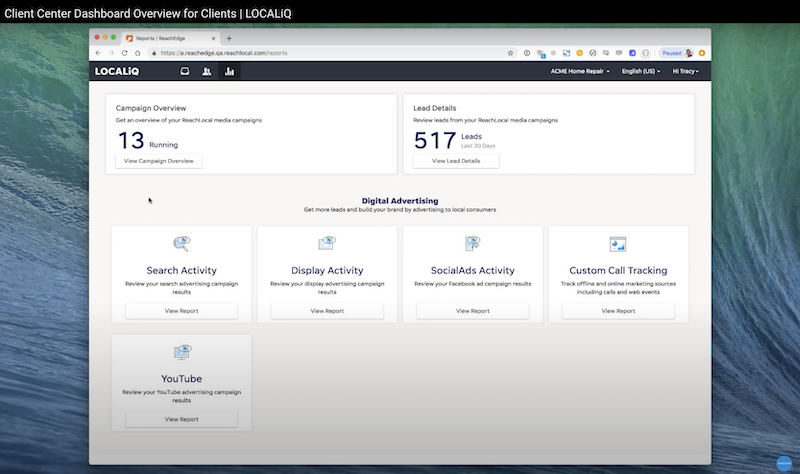
LOCALiQ’s proprietary CRM software comes at no extra charge when you sign on with their local marketing solutions.
While this information does not give you a clear-cut answer as to how much a CRM would cost your small business, it does clearly show that in order to identify the most cost-effective CRM for you, you need to know the features and functionality you require. Because if you go with a free platform that doesn’t generate the reports you need in order to ensure a return on your investment, well then, your CRM really isn’t free after all. So in this final section, we’re going to cover some key features of CRMS to consider.
What to look for in a small business CRM
As we just covered (but in case you skipped it), the various small business CRMs available on the market today all come with their own features and functionalities. When choosing one for your business, remember that price isn’t everything. The right CRM for your business is one that helps you to not only carry out your marketing strategy more seamlessly, but also to gain insights along the way to adjust and refine it—ultimately helping you to win more customers (and revenue) while also saving time and money in the long run. Here are the core features of a CRM designed to help you achieve that:
Ease of use
It’s hard to avoid complexity in any CRM, since it’s very nature is rather complex—it is housing every interaction and piece of information each of your team members and campaigns gathers on each of your contacts, in one place. But complexity doesn’t have to equate to difficulty with navigating the platform. A good CRM is intuitive and keeps things as simplified as possible. You’re looking for a CRM that is not a constant uphill battle, but that has a learning curve that settles out somewhat (not entirely, since there will hopefully be updates and new features to learn).
Advanced campaign tracking
Rather than just seeing how you’re doing overall, it’s important to be able to view your marketing performance at the campaign level. This way, you can see which methods are most effective in attracting customers and leads to your business, as well as which channels and devices within those campaigns are performing best.
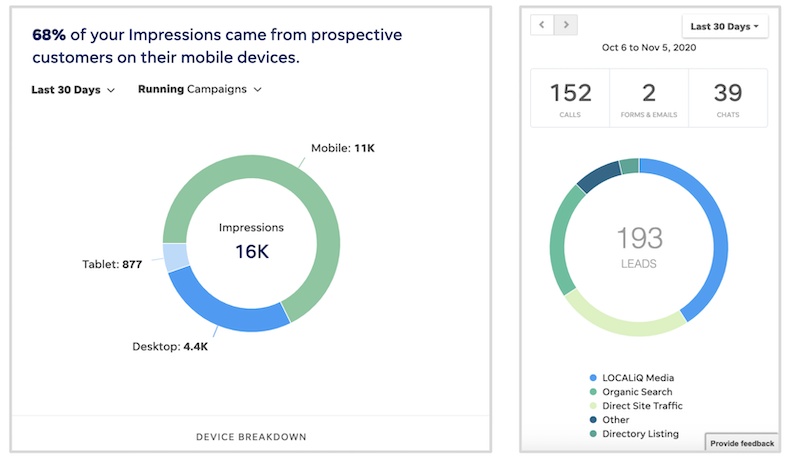
Detailed campaign tracking allows you to identify the sources and devices to optimize for (Image source: LOCALiQ Client Center).
Analytics
So you can see which channels or devices are performing best in a campaign, but how well is the campaign doing overall? With analytics, you can identify benchmarks and also see if the numbers you are seeing are an increase or decrease from a previous time frame or condition. This is crucial in a CRM because it empowers you to make data-driven decisions and know exactly how much you’re getting out of your marketing investments.
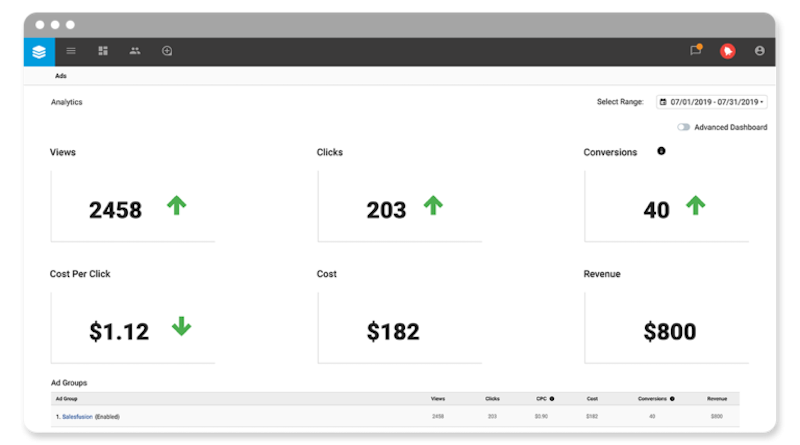
Make sure your CRM can reveal patterns and changes in your data (Image source: SugarCRM).
Real-time data
You shouldn’t have to wait until the end of the month or the end of a campaign to see results. A good CRM will have real-time data capabilities so you can get insights on-demand. This allows you to identify and make optimizations during campaigns, seize opportunities the moment they arise, and ensure you’re on track with your goals.
Customized reporting
Having advanced campaign tracking, solid analytics, and real-time data are all key considerations for a CRM. But also make sure that you can customize your reports by time frame and other criteria. This way you can keep your marketing strategies the way you intended them, rather than mold them around what your CRM is able to report on. Plus, being able to compare campaigns to previous years, channels, and more will allow you to learn, improve, and refine your marketing strategy into a finely tuned lead generating machine.
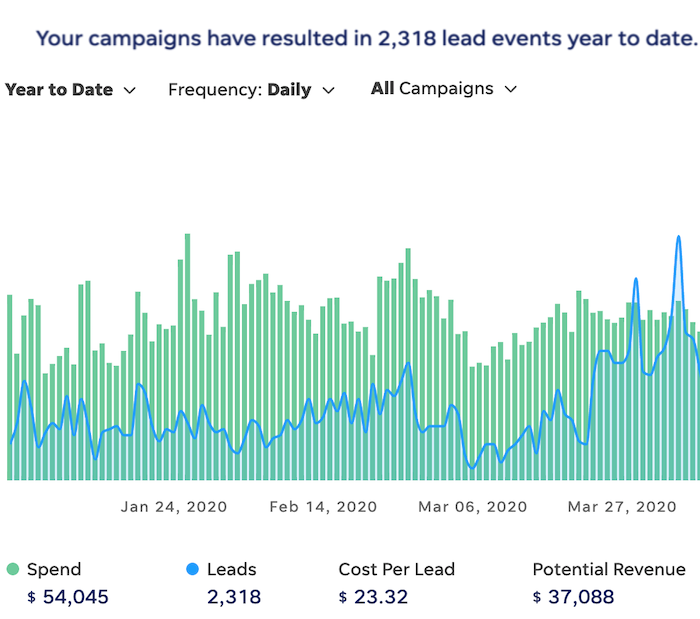
A good CRM enables you to filter your data for specified date ranges and make projections (Image Source: LOCALiQ Client Center).
Integration
Are you using other marketing automation tools or is there any chance you may implement some in the future? Make sure the CRM is compatible with these technologies as well as how complex the integration would be.
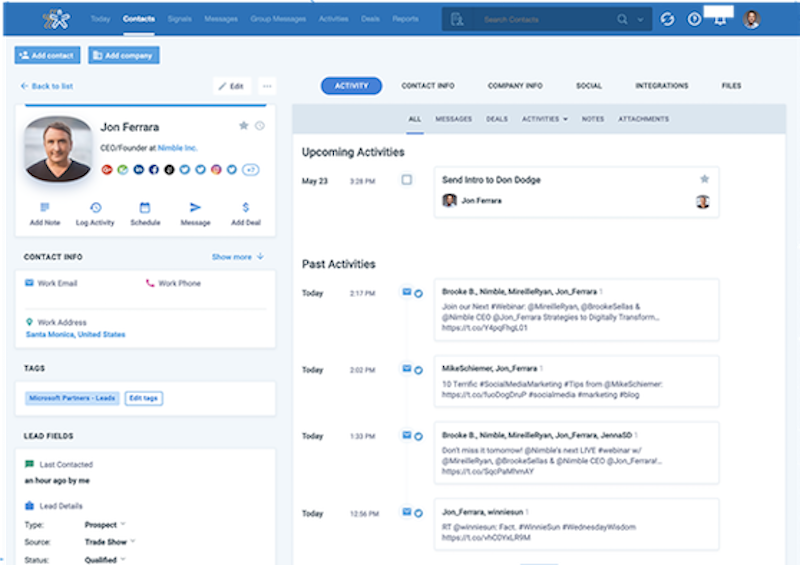
Nimble CRM is geared specifically for social media integration.
Support
Numbers don’t lie, but data can be deceiving (unintentionally, of course). For example, you may become concerned over a decline in your website traffic. But if this occurs concurrently with increase in conversions, then this actually means that while less overall people may be visiting your site, more qualified visitors who are actually interested in your business are arriving there. In this case, that decrease doesn’t mean anything bad, but more likely that your SEO strategies are working well and probably can be scaled up. All this is to say that having access to an individual or team of individuals who specialize in small and/or local business marketing can mean the difference between having a CRM to merely keep track of things and leveraging a CRM to grow your revenue.
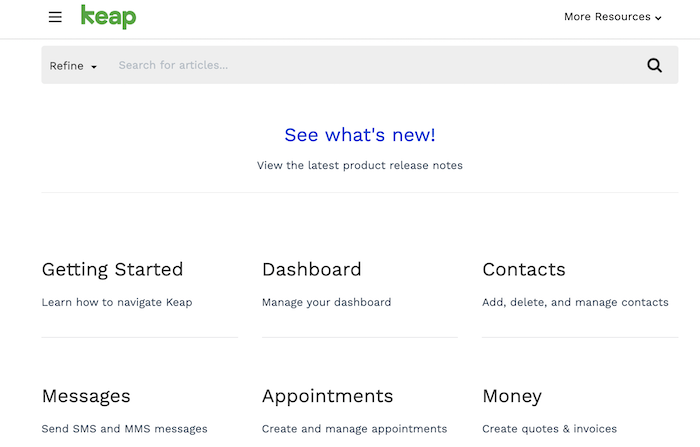
A good CRM will come with support such as through a knowledge base, but nothing beats 1:1 expert advice (Image source: Keap).
Scalability
If your CRM does its job and your client database and sales team expands, can the CRM’s capabilities and pricing plans easily scale with your business? Conversely, if you need to dial things back for a period of time or are going through a slow period, are there flexible downgrade or resource-saving options?
Communication tools
Last but not least (and perhaps most important) in the list of CRM feaures to look for is communication tools. With email integration, you can get notified about new leads and important activity, as well as communicate with your contacts directly from the CRM. This could be an automated email that gets triggered when a contact completes a specified action, a prompt response to a form submission, or a personalized outreach or follow-up email to an individual.
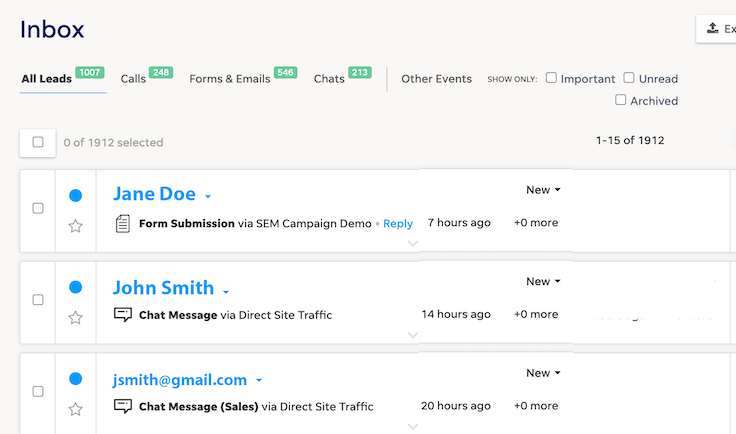
Email is paramount to lead nurturing and customer communication (Image source: LOCALiQ Client Center).
Could a CRM be right for your small business?
As I mentioned at the start, the goal with this post is for you to gain a clear picture of what CRM platforms can do for small businesses as well as the background knowledge you need in order to find the right one for yours, should it be something worth pursuing. Here is a recap of what we covered:
- A CRM is a central location where all of the information you’ve collected on your leads and customers as you engage with them is stored.
- Pros of CRM software include organization, efficiency, and communication, while cons are cost and implementation.
- If implemented properly, a CRM can help a business to increase productivity, customer satisfaction, marketing efficacy, and revenue.
- CRMs vary in price from free to hundreds of dollars per month, but it’s important to know what you’re getting for the price.
And most importantly, here are the features to look for in a CRM for your small business:
- Advanced campaign tracking
- Analytics
- Real-time data
- Customizable reports
- Integration
- Support
- Scalability
- Communication capabilities
Business & Finance Articles on Business 2 Community
(55)
Report Post


